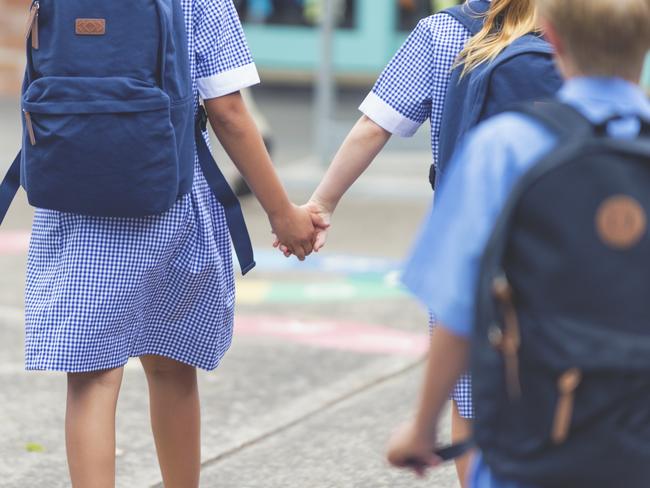Students ‘struggling to read’ in high school, show NAPLAN results
Federal Education Minister Dan Tehan has taken aim at parents after the latest NAPLAN scores revealed kids are not better off than 10 years ago when the controversial test was introduced.

National
Don't miss out on the headlines from National. Followed categories will be added to My News.
Australia needs to do more to close the gap between educational haves and have-nots, leading educators have warned, with too many children leaving school without the skills they need for life.
As parents and teachers review the first results from this year’s NAPLAN tests, out today, there are concerns that gains are not coming quickly or strongly enough.
Today’s results showed:
• An upturn for all student writing results — particularly Year 3 — compared to 2018. Australian Year 3 pupils scored an average 423.1 on the NAPLAN scale, up from just 407 last year and 415 in the base year of 2011.
• Year 7 and 9 results in writing remained below the NAPLAN 2011 average.
• Results in Year 5 numeracy, Years 3 and 5 reading, Years 3 and 5 spelling, and Year 3 grammar, were all above the NAPLAN 2008 average.

Morrison calls for global solution on ChinaFederal Education Minister Dan Tehan said state and territory governments should give greater autonomy to principals, and has urged parents to play a greater role through bodies like school councils.
“We’ve got to make sure that we’re de-cluttering the curriculum so teachers can teach in the classroom,” Mr Tehan told the ABC.
“Let’s give more autonomy to parents and principals to be able to push on and implement these reforms.”
Federal Labor education spokeswoman Tanya Plibersek said the government had failed to reverse declines in reading, writing and maths.
“Kids need to know the basics. It’s the foundation of the rest of their education. We can’t afford for the next generation to be held back,” she told AAP.
MORE NEWS:
NAPLAN: What teachers want you to know
Vital skills: Schools ‘failing to prepare students for uni’
Morrison calls for global solution on China

Peter Goss, School Education Program Director for the Grattan Institute, said education in Australia was generally good — but should be better.
“Despite individual bright spots, overall student performance is declining in international tests, and an unacceptably high number of our students are not ready for life after school,” he said.
“Australian school education faces three major challenges — improving student learning in core academic areas; better preparing young people for adult life; and closing the gap between the nation’s educational have and have-nots.
“Reading in particular has seen some big improvements since (testing began in) 2008 — worth an extra six months in Year 3 and 9 months in Year 5.
“But there are still too many students struggling to read by the time they reach secondary school, and it’s vital that better reading in primary starts to translate into better reading in secondary school — and better reading skills for life.
“By Year 9, the top students in a class are about seven years ahead of the stragglers — so it is incredibly important to help teachers to target their teaching to the right level for every student, especially as so many students move into a new school at Year 7.”

Robyn Gillies, of The University of Queensland’s School of Education, said
it was a concern that Years 7 and 9 writing was still below the average in 2011, when that test was introduced.
“We are above the OECD average [for education] but we still have a long way to go if we are to emulate the success of some overseas educational systems,” she said. “However, I’m encouraged by what I see teachers and schools doing to optimise on students’ opportunities to learn and enjoy learning.”

David de Carvalho of testing authority ACARA said: “Students are to be congratulated for this year’s improvement, especially Year 3 students, where the results are particularly encouraging.
“Overall, the results for 2019 show that since NAPLAN started in 2008, there have been gains in most test areas, particularly in the primary years.
“We normally know that children learn more quickly in primary years then as we go up the slope tends to flatten out — it gets harder to catch up with reading performance as they move into secondary school.
“Years 7 and 9 achievement for writing is still below where it was in 2011, so that’s notwithstanding the up kick that we notice this year.
“So there is still further work in future years to sustain those writing increases if we want to get back to where we were in 2011 — nevertheless, it’s a good start.”
— with AAP
Originally published as Students ‘struggling to read’ in high school, show NAPLAN results
